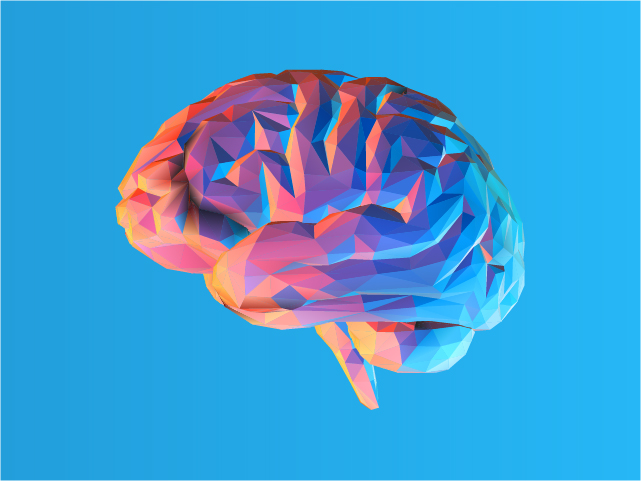Stress is an animal instinct that comes into play when your brain reacts to being threatened. This can be a physical threat, for example pain, or an emotional threat such as psychosocial stress.
Stress can be healthy and energizing, but too much stress can lead to some serious, longer-term issues. But how can you tell the ‘good’ stress from the ‘bad’ stress? To understand why stress affects us, it’s important to understand a little about how the brain works.
In events of stress, your brain releases a steroid hormone called cortisol, which alerts your body to react instantly. This is often referred to as the ‘stress response’. Consequently, your brain goes through a series of reactions, some good and some bad, to protect you from potential threats.
The good stress
When feeling acute stress as a reaction to an immediate event, your brain becomes more alert and your senses heighten. Colours become more vivid and sounds clearer. This state is designed to give you a burst of energy, help you focus and enable you to ‘escape from danger’ and survive.
This ‘good’ stress can help sharpen the mind in different scenarios, such as during a job interview, prior to speaking in public or while playing a competitive sport. Once the threat is over, your levels of stress hormones return to normal with no long-lasting effects.
The buildup of stress
While some occasional stress is not problematic, prolonged (chronic) stress can lead to serious problems.
Psychosocial stress is a major reason for chronic stress, and is especially present in the workplace. It can develop over time when, for example, employees have excessive workloads, feel as though they are not being managed properly or not being rewarded for their efforts.
When chronically stressed, the body creates an excessive amount of cortisol. Instead of all the benefits of the ‘good stress’, abnormally high levels of cortisol will have the opposite effect, leaving you unable to focus and extremely tired. It can also lead to physical symptoms such as headaches, weight gain and chest pains, amongst others.
Stress can affect memory
High levels of cortisol can lead to the deterioration of the hippocampus – the part of the brain associated with learning and memory. As your brain’s energy is focusing solely on ‘surviving’, it leaves the other parts of your brain like the hippocampus deflated and with limited energy.
Additionally, excess cortisol leads to fewer new brain cells being made in the hippocampus. A University of Iowa study proved this by using rats to reveal that high levels of cortisol were connected to short-term memory loss. Consequently, as a result of chronic stress, not only do you forget easily, but you also struggle to remember new information and memories.
Stress can affect decision-making
Stress not only impacts our memory, but many other brain functions. While the brain experiences continuous stress and works on fighting it, another part of the brain which takes a backseat is the prefrontal cortex.
The prefrontal cortex is the part of the brain which coordinates higher-order tasks such as decision-making, judgement and social interaction. However, when you enter in survival mode, this part of the brain doesn’t perform at its best, making it much harder for us to operate intelligently and achieve our goals. Over time, stress can actually cause the prefrontal cortex to shrink, resulting in longer term issues.
Stress can lead to insulin resistance
When you are stressed your blood sugar rises, to feed your brain and help it react. Over a long period of time, your body can actually develop insulin resistance to counteract the high levels of blood sugar.
Studies have proven that employees suffering from psychosocial stress in the workplace can develop insulin resistance. As a result, they are more prone to putting on weight and the development diabetes.
Stress can affect your mood
Your brain records things as you perceive them, not as they actually happen. When you are in a stressed survival mode, you become hypersensitive to the external environment and your brain associates everything as a potential danger. In this state, it is unable to judge situations effectively and misinterprets cues and assumes the worst. Consequently, stress makes every external factor appear negative, putting you in a constant ‘defensive’ mode. This causes abnormal reactions, and over time the brain struggles to readapt and can stay in that negative mode.
Stress can lead to longer term mental health issues
In the longer term, chronic stress sets the scene for more severe mental illnesses such as depression, anxiety and potentially even Alzheimer’s disease. Due to continuous disruptions to the brain’s structure and function, both nerve cells (grey matter) and the connections between them (white matter) are affected permanently. Recent studies have concluded that these changes, along with other factors, can increase the likelihood of developing mental illness.
What can we do to avoid the long-term effects of stress?
Understanding the effects of stress is key to understanding how to alleviate them.
If you suffer from chronic stress, a good start is focusing on how to relieve that stress. This could be changing your lifestyle, or incorporating some stress reduction techniques into your life such as exercise, meditation or yoga.
For more tips on how to manage your stress read our blog article: 6 ways to manage your work stress.
